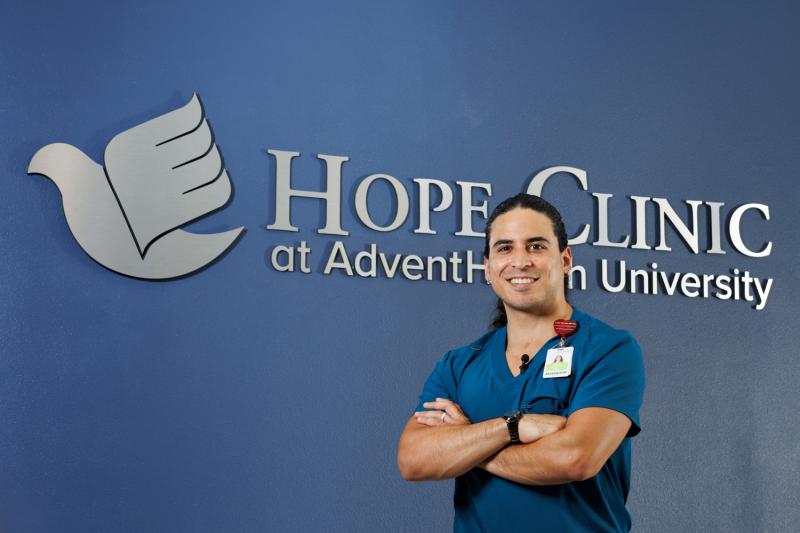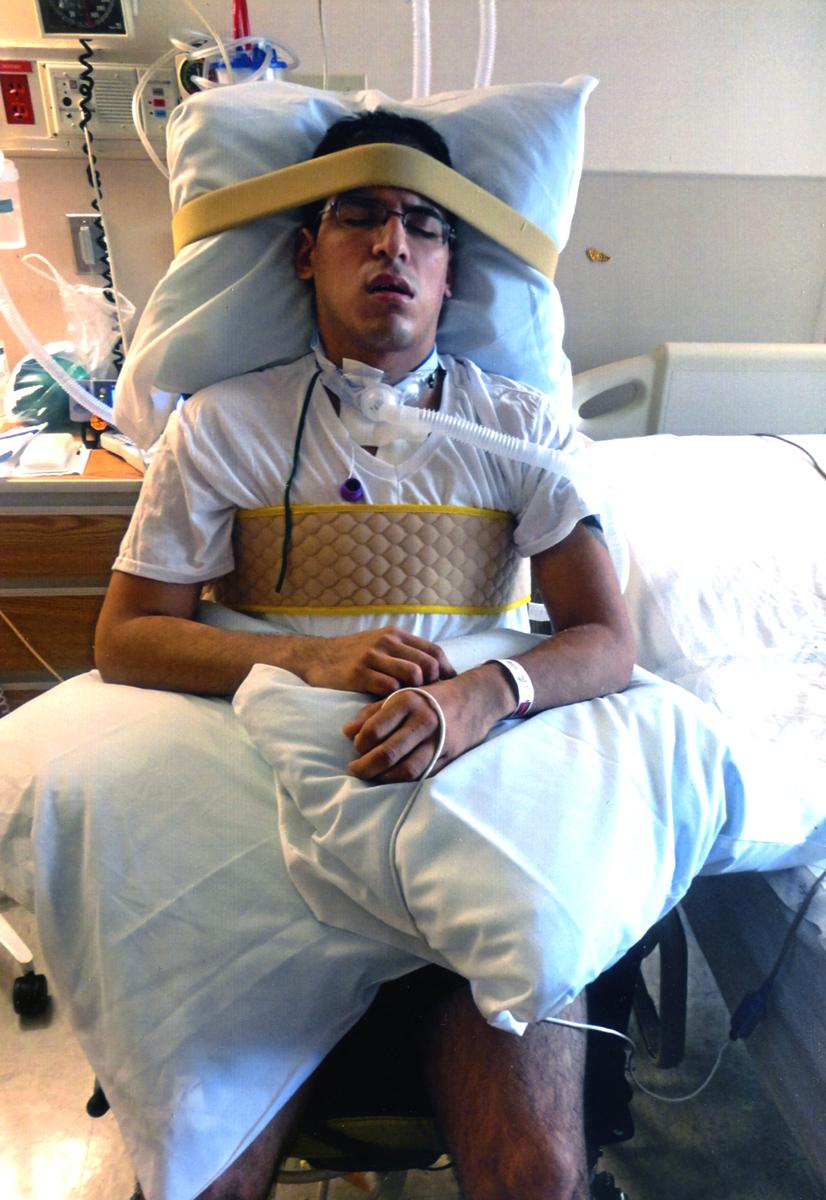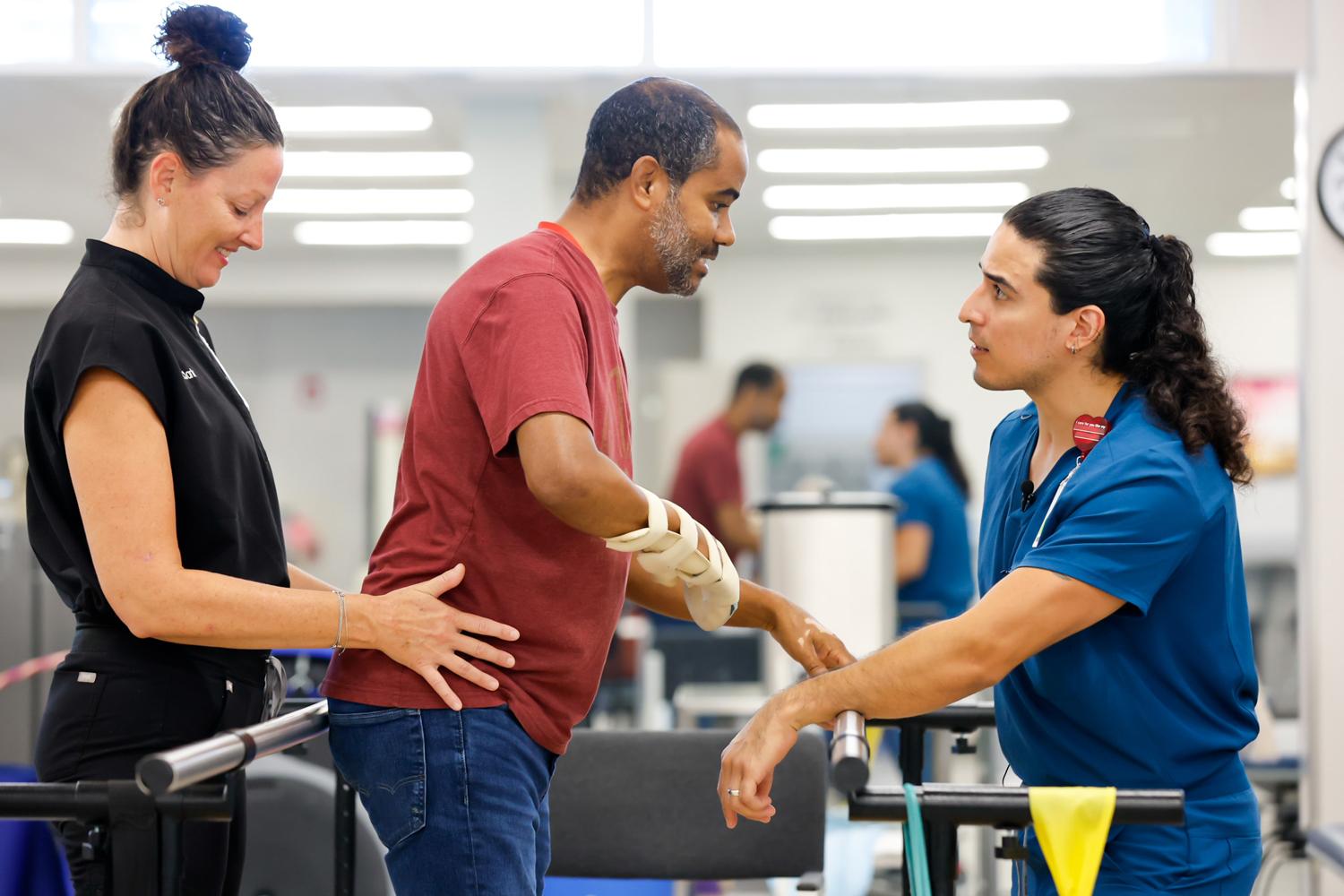- Gary White

Jose Avila appreciatively recalls all the therapists who supported him during the months he spent in a hospital while recovering from a traumatic brain injury.
The names come quickly to him: His speech therapist, Mike; his occupational therapist, Amanda; his physical therapist, Christine, and her assistant, Nana.
Avila, a doctoral student in the physical therapy program at AdventHealth University, hopes that someday he will be able to have the same beneficial impact on patients assigned to him.
“Maybe someone who I'm treating ends up becoming the president,” said Avila, 30. “Maybe someone I'm treating saves the world by inventing the cure to cancer. So it seems like all of this is part of a plan, and I'm intended to continue on this path, whether I’m the main protagonist or I’m just a supporting character.”
Avila is participating in the second of his four clinical experiences, at AdventHealth Altamonte Springs, and he expects to graduate from the program in May 2025. As he works with patients, his empathy is infused by memories of his long and difficult recovery following an injury that forced him to regain his capacities for speech and walking.
Avila spent his early youth in Brooklyn, New York, and moved with his family to Orlando when he was in middle school. At age 19, he was working as a carpenter and taking evening classes at Valencia College.
One afternoon in September 2013, Avila was driving to a class at Valencia’s Orlando campus. As he pulled out of his neighborhood, a vehicle speeding around a turning car slammed into the passenger side of Avila’s Honda Accord at about 55 mph. He was airlifted to the hospital, where he remained in a coma for about 10 days.

Doctors diagnosed Avila with a traumatic brain injury and an intracranial hemorrhage, or bleeding in his brain. He also had a collapsed lung but somehow escaped without any broken bones.
“I just injured the most important part of me,” he said.
The early prognosis was not encouraging.
“My family would always ask, they're like, ‘Is he going to be mentally cognitive? Is he going to have any abilities? Will he be able to talk with me, communicate with me?” he said.
Doctors told his parents they could not predict Avila’s ultimate condition. His parents later told him that doctors gave him only a 50 percent chance of survival.
A traumatic brain injury can cause dangerous levels of swelling, and sometimes doctors must perform a craniectomy, removing part of the skull to relieve pressure. Avila is grateful that such an intervention was not required.
Avila’s mother, who worked at an elementary school, took a leave from her job to spend every day with him at the hospital, and his father visited as often as he could.
Avila doesn’t remember anything from the period after he began to regain consciousness, as he remained heavily sedated and dependent on a tracheostomy tube. His first memory is from late October, several weeks after the accident, when he awoke at about midnight and thought he heard someone calling to him.
He tried to call out in response but realized he couldn’t speak.
"And so nothing was coming out,” he said. “So then I guess I got frustrated, and then I was like, ‘OK, she can’t hear me, and I'll get up and show them where I am.’ And so, when I tried to walk on the side of the bed, I actually fell onto the floor and I bruised myself up a little bit more.”
A specialist soon diagnosed Avila with Broca’s aphasia, one of three forms of language deficit resulting from damage to the brain. Patients with Broca’s aphasia typically struggle to form words, though they understand the language they hear.
The traumatic brain injury had the effects of a stroke, Avila said, disrupting functions in the left side of his brain, which controls the right side of his body. At first, he communicated with family members by typing on a keyboard.
“They had a little laptop, and so I just typed it all out with my left hand, because my right hand was useless at that point,” Avila said. “So I was able to get my words across that way initially, and then eventually I started being able to speak with, like, one-word answers, but very slowly, because it was just taking a long time for me to actually cognitively think of what I'm trying to say. And then I was able to slowly get to small sentences.”
Avila remained in the hospital for a few more weeks, and that was when he began receiving speech, occupational, and physical therapy.
“When I was in the hospital in acute care, their biggest priority was keeping me alive,” he said. “And then in in-patient (therapy), it was, ‘OK, let's get him to stand up. And let's get him to start taking a couple steps.’ And so, I have videos of me first learning how to walk, and I look like Bambi when he was first learning how to walk.”
Avila continued with outpatient therapy after leaving the hospital shortly before Thanksgiving, about 10 weeks after the injury. At home, he struggled to make one circuit around the block using a walker. After countless laps, he progressed to walking slowly with a cane, and eventually he managed to walk without the cane.
A former high school wrestler, Avila reached a milestone when he first jogged around the block.
Regaining his capacity for speech was an equally slow and arduous process. He recalled playing Taboo, a word-guess game, with a group of friends. In the game, one player tries to prompt the others to say a designated word without speaking a list of forbidden words.
“I remember I was playing the game Taboo with them, and I knew exactly what they were trying to show us, but it wasn't coming out,” Avila said. “I couldn't get it to come out.”
More than a decade later, Avila said he still finds that words don’t always emerge as easily as they did before the injury, both in English and Spanish.
Avila resumed his education at a cautious pace, first auditing a single class for a semester at Valencia College before pursuing enough credits to earn his associate degree.
Avila was working as a personal trainer when his wife, Kirsten, whom he met five years ago, encouraged him to seek his bachelor’s degree. He graduated from the University of Central Florida in 2022 with a degree in kinesiology.
Just three days later, Avila began the faith-based graduate program at AdventHealth University to pursue a Doctor of Physical Therapy degree. Students progress through foundational and clinical sciences, patient/client management skills, and person-centered care, accumulating 126 graduate-level credits.
“He's super enthusiastic about it,” Kirsten said. “I mean, he always comes home every day talking about everything he learned at school and how excited he is about the experiences he's having with the (clinical) rotations. So, he's like a big, old physical therapy nerd.”

When he began studies at Valencia College before the accident, Avila had not settled upon a possible career. He was considering engineering, law enforcement “and everything in between.” Asked if his exposure to a range of therapists during his recovery from the injury influenced his decision to study physical therapy, he answered, “Oh yeah, 100%. I didn't even know what physical therapy was before the accident.”
Avila, father of a 2-year-old boy, is not certain about the area of physical therapy he plans to pursue, but he has an inclination.
“Currently, I think I am leaning more to a neurological route,” he said. “So, working with someone who suffered a stroke; someone who's also suffered a TBI, traumatic brain injury; working with somebody who has MS, multiple sclerosis; working with someone who has Parkinson's disease, etc., etc.”
Kirsten, a marriage and family therapist, said her husband is dedicated to his chosen field.
“It’s always felt more like a calling and a passion, I think, for him than a job in the way that he talks about it, something more like a way that he wants to give back, because people really gave to him in that way,” she said.
Experience taught Avila the positive impact that physical therapists, along with speech and occupational therapists, can have on the life of a patient struggling to regain lost functions. He looks forward to the day when someone will recall the crucial support a therapist name Jose provided as they recovered from an illness or injury.
“I want to pay it back to future patients and generations who also find themselves in a similar situation as what I experienced, because I've kind of experienced both sides of the coin,” he said. “I was the patient, and now I'll be the therapist. And I feel like I would be able to connect more with patients that way. Hopefully, I'm here to change people's lives, just like how this whole experience changed my life.”
Recent News
-
Physical Therapy
Valerie Lara discovered her passion for health care while in the U.S. Marines and is working toward her degree in Cardiovascular Sonography.
-
Physical Therapy
Faculty at AdventHealth University’s Hope Clinic are receiving national recognition for a year-long study showing the positive impact of free long-term occupational therapy on low-income patients.
-
Physical Therapy
Three AHU Students become the first from AHU to receive scholarships from the Hispanic Heritage Scholarship Fund.